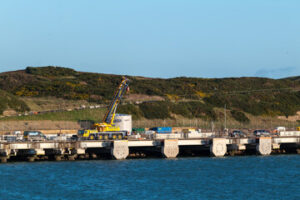A well-designed website can serve as a digital storefront and showcase your business’s work. It can also help you generate leads and build trust with potential clients.
Ask for references and check online reviews. You can also ask about the quality of their work and whether or not they communicated clearly throughout the process. Contact Charlotte Fence Company now!

When hiring a fence contractor, make sure they have the proper licensing and insurance. This will protect you from any damage that could occur during the project and will also cover injuries to the workers on your property. Most contractors should carry general liability and workers’ compensation insurance. If they do not, it is best to look for another contractor.
Licensing requirements for fencing companies will vary depending on where you live and the type of business you are starting. You should check with your local, state, or provincial government to find out what is required for your area. In addition, you should register your business name and trademark it if possible. You should also consider obtaining a business permit from your local municipality.
If you’re thinking of opening a fencing company, it is important to write a business plan that outlines your goals and plans for the company. This will help you identify your target market and create a strategy for attracting customers. It will also help you secure startup capital from investors.
The best way to start a fencing company is to find a niche and build a reputation in your industry. Many people choose to start a residential fencing company, but you can also focus on commercial projects. Before you choose a niche, you should do your research and find out what types of fences are most popular in your area.
A successful fencing company requires a great deal of hard work and commitment. To avoid making costly mistakes, you should learn as much as you can about the business and make sure to hire the right employees. You should also invest in quality tools and equipment to ensure the best results.
A licensed fence company will have general liability and workers’ compensation insurance, as well as a business owner’s policy. This is essential for any construction job, and it will cover any damage that may occur during the project. It will also protect you in the event of a lawsuit from an employee or third party. However, if you work in a very physical field, like roofing, you will have to pay higher rates for insurance.
Choosing a fence company that has years of experience in the industry is important. This will ensure that your fence is built to last and has a high level of quality. You should also look for a company that offers a warranty on their work. Make sure that you understand what the warranty covers and whether it includes installation or materials.
A fence company should be licensed and insured to provide services in your area. They should also have workers’ compensation and general liability insurance, as well as a certificate of compliance from the state where they operate. These documents will provide you with peace of mind, and they will help you avoid a lawsuit if the contractor damages your property or injures someone.
Before hiring a fence company, you should check their website for contact information and pricing. Many fence companies will offer a free estimate for their services. Some will even provide a design service to help you choose the best fence for your needs. Once you’ve found a company, you can schedule your project and discuss the details with the estimator.
If you are looking for a fence company that has a good reputation and is well-established, you may want to consider a franchise. This type of company will give you a recognizable brand name, marketing support, and an established business model. However, it can be expensive to purchase a franchise. You should also research the market to find out what types of fences are popular in your region.
It would be best to look for a local company that helps property owners increase their privacy and security. Its crew installs new fencing made of durable materials like wood, PVC, and chain link. It can also repair existing fences with holes, rust, and wood rot.
In addition to providing fencing services, this family-owned business specializes in custom deer fences. Its team also builds pool, enclosure, and warehouse partition fences. It uses products from Key-Link, Bufftech, and Aruvil brands to meet its clients’ needs. Its crew members have over 25 years of experience in the field.
Fences are an excellent way to keep kids, pets, and other intruders off a property. They also provide privacy and enhance a home’s curb appeal. However, fencing can be expensive. When you are choosing a fence company, make sure to get multiple quotes and ask for references. It’s also important to hire a land surveyor to accurately measure the site for your fence. This will ensure that your fence is built within the legal boundary of your property.
If you are considering starting a fence company, it’s important to have a plan for how you will market your services and create an accurate pricing model. You can start by identifying your target audience and determining what type of fencing you will offer. You can then develop a business plan to guide you through the process of creating a successful company.
The business plan should include a detailed description of your services, the products you will sell, and the costs of materials and labor. You should also include an estimate of the time it will take to build a fence, as well as the total cost of your services. Once you have a detailed pricing model, you can begin attracting potential customers and growing your business.
A fence company’s profitability depends on the types of fences they sell and their installation costs. Some fence companies offer a wide variety of options and prices to meet the needs of customers, while others are more focused on specific styles and materials. A good fence company will have a strong reputation and high customer satisfaction rates.
Family Fence offers residential and commercial property improvement solutions in Queens and the surrounding areas. Its crew installs chain-link, wrought iron, and ornamental iron fence systems. It also offers custom wood, vinyl, and PVC structures. It carries products from Easter Ornamental Fence, Illusions Vinyl Fence, and System21. Its staff is also capable of building awnings and decks.
There are small business administrations that have several loan programs for fence construction businesses, including the SBA 7(a) line of credit. This option is ideal for businesses that need working capital, inventory, equipment upgrades, or business expansion.
A fence company should have a solid reputation to attract customers. This can be achieved by using a brand name that is well-known in your community, creating a website, and using social media to share photos of previous projects. It’s also important to invest in business cards, vehicle wraps, and branded uniforms for employees. Lastly, list your company on lead generation sites, like Angi and Thumbtack, to find clients who are looking for fencing services.
